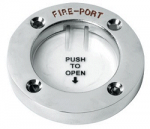[70521]
Well-Known Member
I wonder what type of fire extinguisher they had onboard.
I totally agree, question was assuming no choice but to jump for whatever reason.To the OP, this post is not a criticism of your original question.
Nobody has yet mentioned putting the fire out before jumping in the sea...the idea of fighting a fire is fairly daunting, or even totally unthinkable, if you haven't had training.
In the OP's case, a firefighting course (resulting in an educated choice of serious extinguishers) would probably prevent the need for getting wet.
In my view the 3 nastiest hazards are, in order: The 3 F's.
Fire
Flooding
Falling in the Sea.
The RYA hardly mentions firefighting courses, but bangs on about sea survival ones. Of which a large proportion is about launching, righting and entering liferafts, which is very rare.

....
Seems a fire in a small space should always be able to be put out if an extinguisher can be used without having to open a hatch allowing flames out and air in. But having to hold open a hatch with one hand while having to operate a fire extinguisher with the other 2 hands doesn't add up.
I'm a strictly MAB sailor and never had one or seen one on other's boats (might not have looked hard enough). Next inboard engine boat will certainly have one or 2 though. I guess its not too hard to lift a companionway top step a bit to shove the nozzle in and pull the trigger but for that price its mad not to have a proper little port for the job.Not sure what you mean about "holding up a hatch" - any small boat engine bay will/should have a small diameter hold for you to poke an extra extinguisher through without allowing lots of lovely fire-friendly oxygen inside
AWBs pretty much all have a hole, but I've never seen a fancy little flap that I'm aware of

I think the idea is to keep noise and fumes out of the cabin.Now I think about it, that flap would achieve nothing at all on most boats. Mine has two 4" ducts to bring fresh air in to the engine compartment from the stern!
......The RYA hardly mentions firefighting courses, but bangs on about sea survival ones. Of which a large proportion is about launching, righting and entering liferafts, which is very rare.
AbsolutelyThe thing to bang on about is fire prevention, not fire fighting. I'd guess there are very few "accidental" fires, and most are caused by neglect of something very simple.
And? What is your point. I think I said I was getting off the boat didn't I? Why do you have to try to turn everything into an arguement on here? Chill out. You won't get one from me. Bye.You should try watching fibre glass burn some time! If a GRP boat is on fire, put it out or don't be on the boat
100 % agree. We've probably attended the same courses over the years.Having spent my entire working life on or concerned with the sea and having completed many survival and firefighting courses I would make the following observations.
Only try to extinguish a fire if is is small, easily accessed and within the extinguishing capability of your equipment ie don't waste time trying to extinguish a big fire with a small extinguisher.
Entering the water should always be a last resort when other options become impossible. eg life raft, dinghy etc.
ALWAYS ensure your lifejacket is inflated before entering the water. Cold shock could render you incapable or even unconscious. Even if its an automatic inflation model, trigger the inflation manually just before entering the water. (you never know - the auto function may not work)
At least know how to launch and right a life raft or preferably go on a one day course. Quite important as sods law says your life raft is going to inflate upside down.
I wasn't trying to start an argument, simply pointing out that you almost certainly don't have time on a GRP boat because it burns exceptionally fast once alight.And? What is your point. I think I said I was getting off the boat didn't I? Why do you have to try to turn everything into an arguement on here? Chill out. You won't get one from me. Bye.
P.S. I have seen fibre glass burn and been in some fairly major fire scenarios in the oil and gas industry. I base my comments on the training and experience I received from professionals.